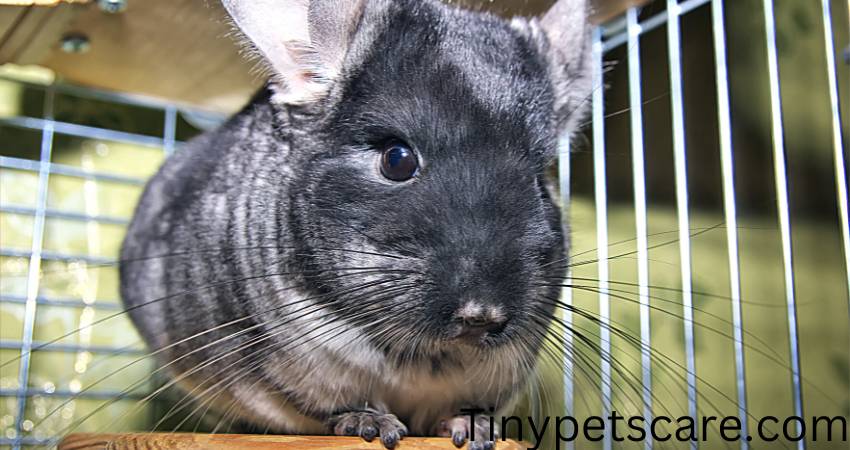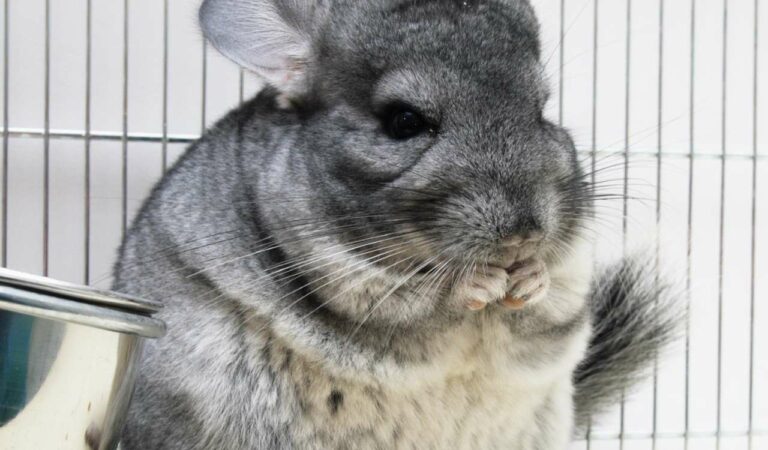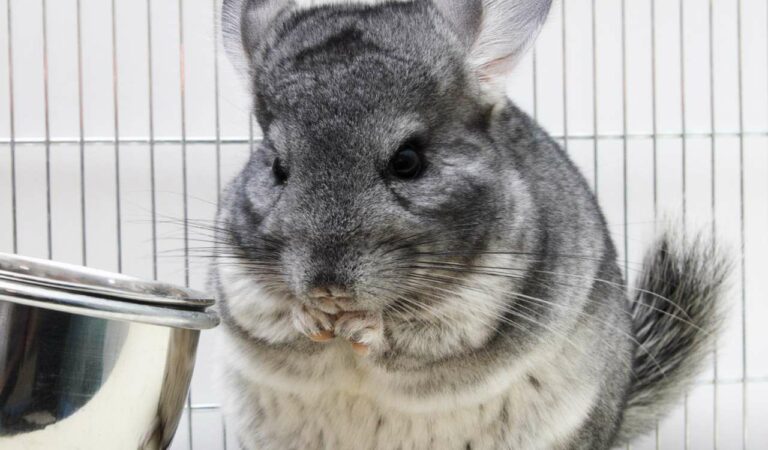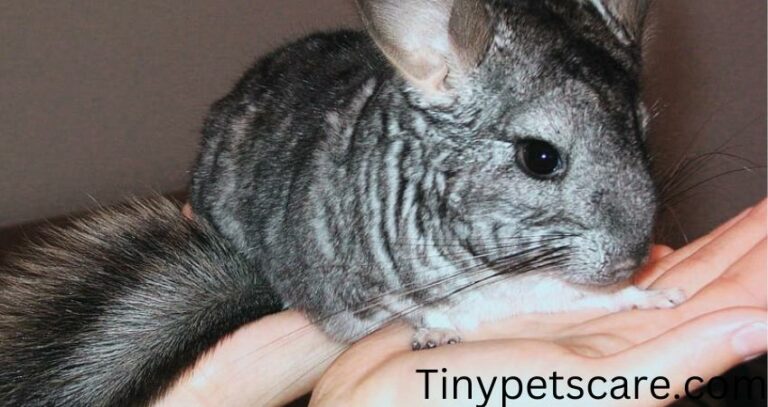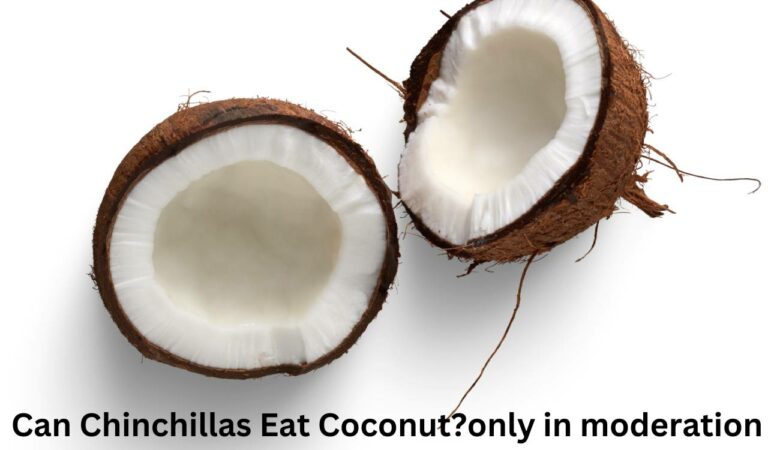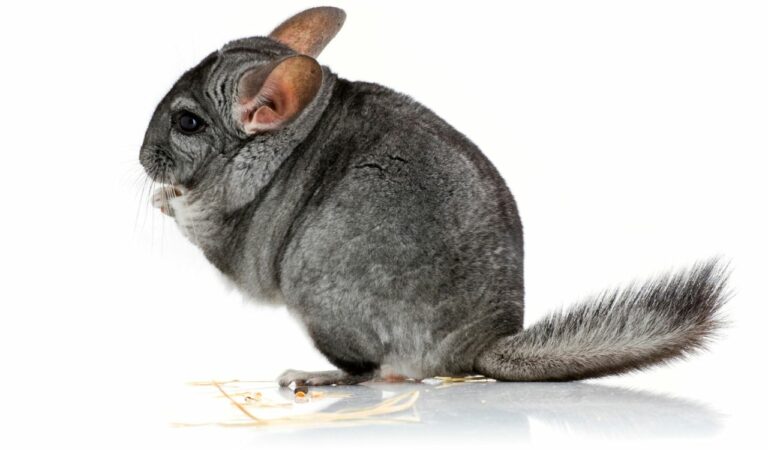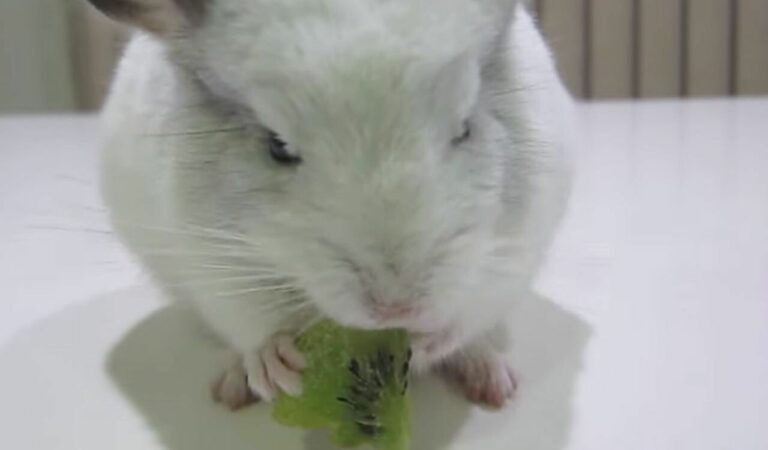Can Chinchillas Eat Plastic? (Avoid This Toxic)
Chinchillas are omnivores, so this means they eat a variety of foods. They like meat, fruits, and vegetables. They also enjoy nuts and seeds— they eat anything chewable!
So, can chinchillas eat plastic? Yes, they can, but chinchillas can’t digest plastic like other foods such as grains or vegetables. If a chinchilla eats plastic, it could cause serious health problems for the animal. If left untreated, this could lead to an intestinal blockage which could result in death from starvation or dehydration due to thirst.
Well, here is everything you need to know about Chinchillas and plastics. We will also discuss how to stop your pet from consuming the substance.
Can Chinchillas Eat Plastic?
Chinchillas are curious creatures and will chew on anything that comes their way. This includes bags, bottles, containers, and other materials made from plastic. However, plastic is toxic to them and should be avoided.
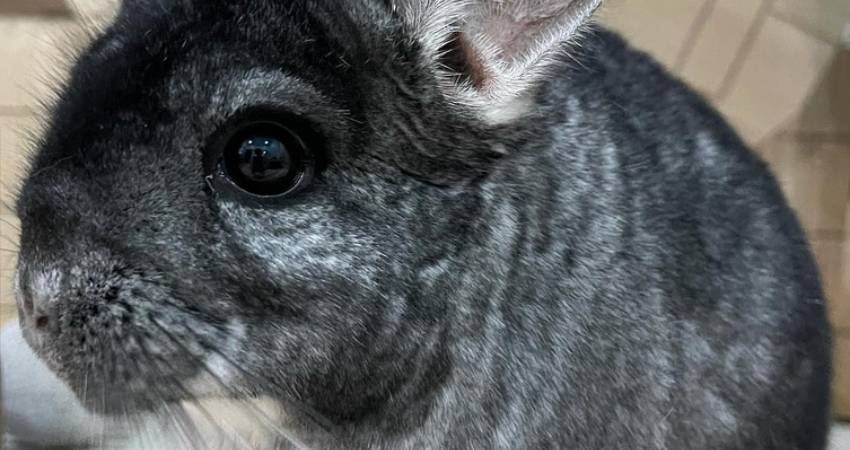
Related Blog: Can Chinchillas Eat Dates? [Read More]
What Happens If A Chinchilla Eats Plastic?
1. Gum and teeth problems
The most likely cause of tooth problems in chinchillas is eating plastic. Chinchillas chew on everything from plastic bags to bits of plastic in their food. The problem is that many plastics are made from petroleum products. Petroleum products can cause issues with their teeth and gums.
Plastic can get stuck in your chinchilla’s teeth or even damage them when you don’t notice it immediately. They may also experience difficulties chewing and swallowing food due to this problem. If they can’t chew well, it can lead to digestive problems or malnutrition if left untreated long enough.
Chewing plastics can cause misalignment or malocclusion of teeth. This is especially problematic if you have a young chinchilla who has just started to chew on its own teeth. It could lead to serious dental problems like abscesses or tooth decay. The young pet might also avoid eating food due to pain. If they can’t eat well, your pets will suffer from malnutrition.
2. Digestion track issues
Chinchillas, like all mammals, have a digestive tract. It works to break down the food we eat and to get rid of any waste that’s left over. The digestive tract comprises the mouth, stomach, and intestine.
When a chinchilla eats something with plastic in it, the plastic can cause issues in all three parts of its digestive tract. These issues include intestinal blockage and intestinal inflammation.
Intestinal blockage occurs when food gets stuck in the intestines and can’t be digested. This can lead to serious health problems for your chinchilla if they don’t get help immediately. It could also cause them to starve if they can’t get nutrition from eating.
Besides, eating plastic particles can cause intestinal inflammation by creating an allergic reaction in your chinchilla’s body. It can cause vomiting or diarrhea, leading to dehydration and malnutrition if not treated.
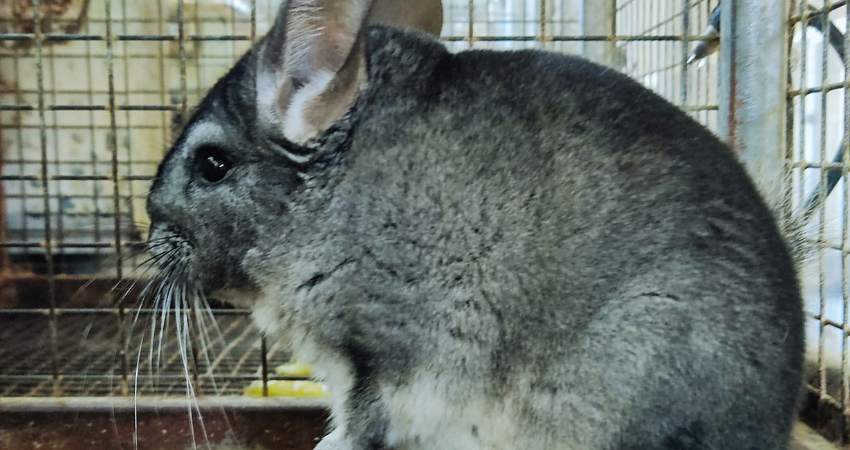
3. Chemical leaches
Plastic isn’t just dangerous to the environment; it can also harm your chinchilla’s health if they eat too much or too often. The most obvious danger is that there are harmful chemicals in plastics. They can leach into the animal’s food and could harm their health over time.
If you notice unusual symptoms like vomiting or diarrhea, your pet might have eaten plastics like toothpaste tubes.
According to studies, plastics can also lead to cancers in animals. These substances may cause Bisphenol A (BPA) poisoning. BPA in plastics has been linked to cancer in studies involving rodents.
4. Death
Chinchillas can die from eating plastic. The main concern is Bisphenol A (BPA). This chemical makes hard plastics like those used in water bottles, food storage containers, and toys.
Studies had found that when rats were fed BPA-laden food, their hearts shrank and died earlier than normal. The same happens to any other mammal exposed to BPA in their food or water: estrogen hormone levels spike too high, leading to early aging and heart disease.
Related Blog: Can Chinchillas Eat Pumpkin? [Read More]
Why do Chinchillas eat plastics?
Chinchillas generally prefer to eat things like fruit, vegetables, and Grass hay. So when they’re not eating fruit or vegetables but are exposed to plastic products —they may be snacking on them. So, why do these pets even eat plastics?
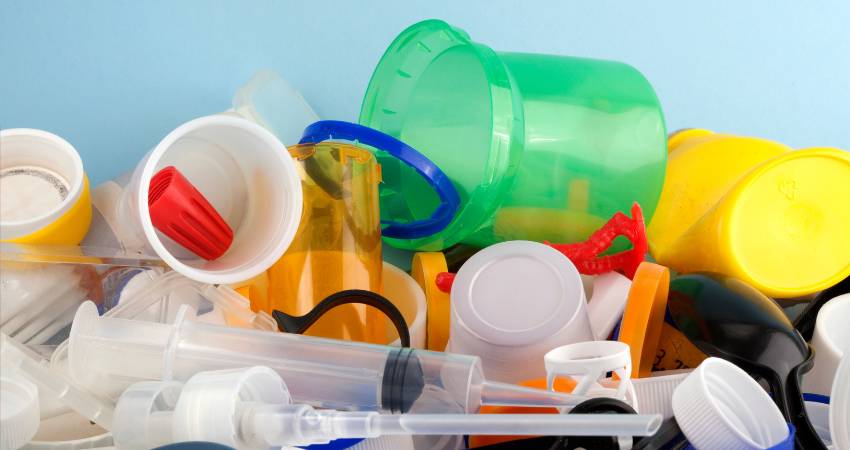
- It’s easy to find: Plastics are everywhere these days—on streets, in parks, and even in your own house! If your pet is bored or hungry while you’re out at work or school all day long, it may eat plastic as an alternative treat!
- Chinchillas are adventurous: Chinchillas may be small, but they have a highly adventurous spirit. They love to explore new things, sometimes leading them to eat plastic. They like to nibble on objects that feel interesting. You’ll often find them gnawing on household items like plastic bags and water bottles.
- Gnawing: Chinchillas are fuzzy, furry creatures that love to gnaw on things. And one of the things they like to gnaw on is—you guessed it—plastic. Rodent teeth keep growing throughout their lifespan. So, they need to file them down through gnawing.
Related Blog: Can Chinchillas Eat Toilet Paper Rolls? [Read More]
How do I stop my chinchilla from chewing on plastic?
Since these pets chew anything, it’s important to ensure that their surroundings are free of plastic. Here are some ways you can keep your chin from chewing on plastic:
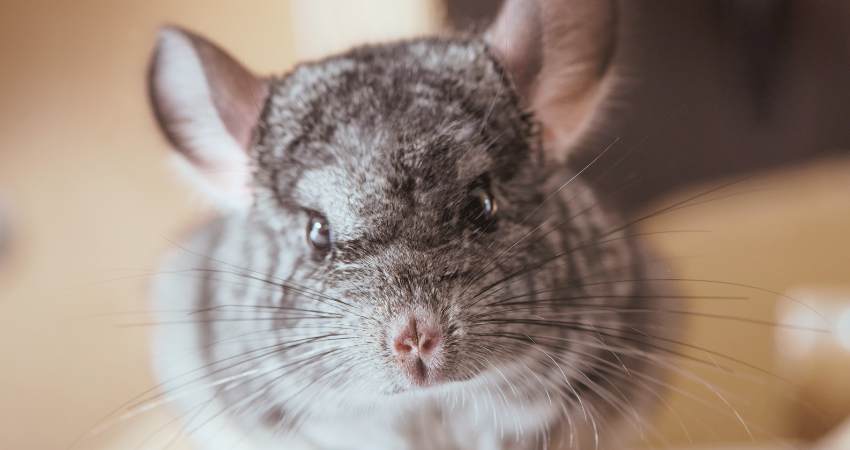
Image Source: canva.com
1. Avoid chew toys
Chew toys are meant for dogs, not chinchillas—you need to avoid toys. Chinchillas tend to shred any new toy that they get in their hands. This can be quite dangerous if the chinchilla owner doesn’t realize it. The best way to prevent this habit is to avoid giving your chinchilla a chew toy.
If you want to give them chin toys, make sure they’re made of a hard material they can’t chew. You can also get them chin-friendly toys or DIY some toys for them.
2. Ensure there are no plastics around
This step is really simple: just keep plastic out of your chinchilla’s reach! Plastic bags, plastic wrapping for food, plastic water bottles—you name it! Chinchillas love chewing on these types of things, so ensure they aren’t within reach at all times.
Clean their cages or surroundings regularly to ensure no plastic is lying around. You should also have waste bins on your property to discourage visitors from littering.
3. Cage the rodent
Cage your chin if you want to prevent it from chewing on plastic. Caging ensures they cannot access the outside, where they can come across littered plastics. Ensure there are no openings in it except for a hole for food or water. The holes should be small enough to prevent your pet from escaping.
Note that the cage should be at least 5 times the size of your pet. Your chin needs enough space in its cage to not feel claustrophobic. You need good ventilation, too, to avoid suffocation. The right cage design will ensure your animal doesn’t suffer from boredom or anxiety.
4. Avoid cages and feeders made of plastic
You don’t want any piece of plastic near your chin. So, invest in a cage made from wood or other safe materials for your pet. There are many different types of cages on the market today. Do some research and find one that fits your needs.
Also, get hay feeders made of wood or rubber. These materials are safe for your chin to ingest.
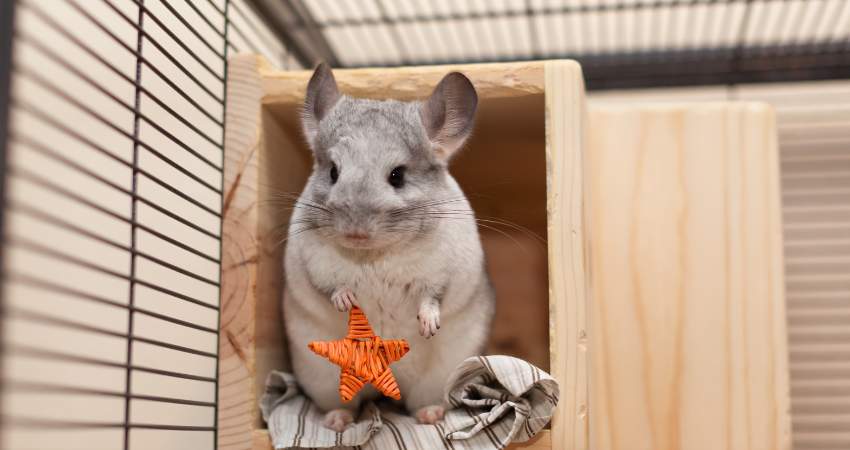
5. Ensure the pet has enrichment items
The best way to stop your chinchilla from chewing on plastic is to ensure that it has enrichment items available to play with. If you don’t have any, consider getting some from a local pet store or online.
There are many different types of items and toys that chinchillas can use, so you should be able to find something that appeals to them. Most importantly, these items should be safe and appropriate for their age and size, so make sure you choose wisely!
6. Cover wires and cords
Chinchillas love to chew on wire and cables, so you may want to cover them up. You can do this with hard casings. If possible, run your wires and wiring pipes inside the walls. So they are out of reach of your chin.
Additional safety precautions to take
Chinchillas are intelligent animals. They may be able to figure out how to get plastics even when you have done everything to keep their environment free of plastics.
The best way to avoid this is by monitoring your chinchilla.
Monitoring the chinchilla’s behavior can help you determine if your chinchilla is chewing plastic. You will be able to notice digestion tract issues as early as possible before they turn catastrophic.
Related Blog: Can Chinchillas Eat Pine Cones? [Read More]
Related Questions
Here are some of the commonly asked questions:
What should I do if my Chinchilla has chewed plastics?
If your chinchilla has chewed plastics, we recommend you take them to a vet. They can examine your pet and determine what treatment it needs.
But before you even think of taking them to a vet, remove any other plastics nearby. This act will discourage further chewing.
Can chinchillas digest plastic?
Chinchillas can’t digest plastic. They can digest meat, grass, and other fibers. If Chinchillas eat plastic, they won’t digest it. Instead, the plastic passes through their digestive system and comes out the other end if possible.
Can chinchillas have plastic in their cage?
No, chinchillas cannot have plastic in their cage. They should never be left with any kind of plastic in their environment. Plastic is highly toxic to chinchillas, who can ingest it through their food or chew on it for fun. If ingested, it could lead to a list of problems discussed in this write-up.
With Everything Said and Done
Chinchillas are known for being fun-loving creatures and adventurous. These pets eat literally anything they come across. However, they should never be fed plastic since the material is toxic to pets. They contain chemicals that can cause digestive issues in these pets.
The ingestion of this material can also lead to tooth problems, malnutrition, digestive tract blockage, and inflammation in chinchillas. In extreme cases, it can lead to chemical leaches, which can cause deadly cancers or even death. If your little buddy has consumed plastic, take them to the vet to get it checked. The vet will help determine any illness or injury associated with eating plastic.
Related Posts:
